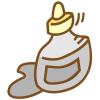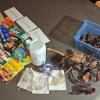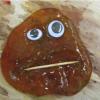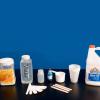Search Results
Showing results 1 to 7 of 7

Guar Gum Slime
Source Institutions
In this activity, learners create a gelatinous slime using guar gum powder and borax. Educators can use this simple activity to introduce learners to colloids.

Gluep
Source Institutions
In this chemistry activity, learners make a slimy non-Newtonian fluid called "Gluep." Use this activity to introduce learners to polymers and viscosity.

Got Seaweed?
Source Institutions
In this activity, learners examine the properties of different seaweeds, investigate what happens when powdered seaweed (alginate) is added to water, and learn about food products made with seaweed.
Globby Gooey Gak
Source Institutions
In this activity, learners concoct some stretchy green goo called Gak. This activity will introduce learners to polymers, chemical reactions, and how scientists invent new materials.

A Slime By Any Other Name
Source Institutions
This fun video explains how to make a batch of oobleck (or slime) and why this special substance is known as a "non-Newtonian" fluid. Watch as Mr.

Squidgy Slime
Source Institutions
In this chemistry activity, learners transform two ingredients (4% polyvinyl alcohol solution and 4% borax solution) into gooey slime.

Slime
Source Institutions
Learners make slime from white school glue and Borax detergent. The long chain molecules of the white glue become cross-linked by the Borax into a big network.
